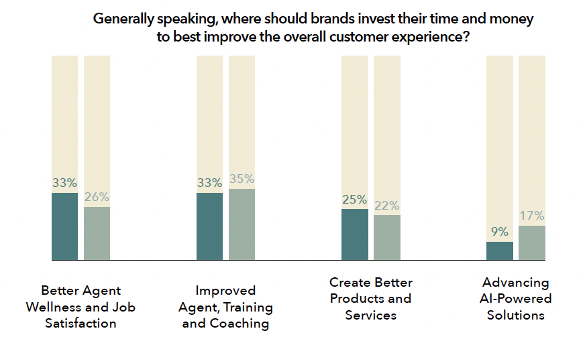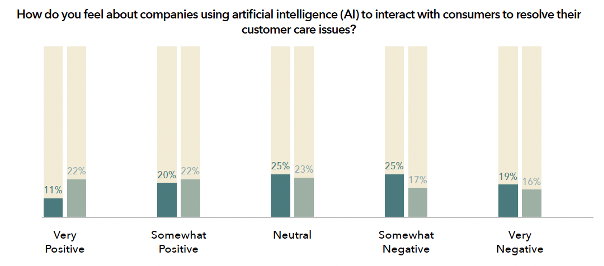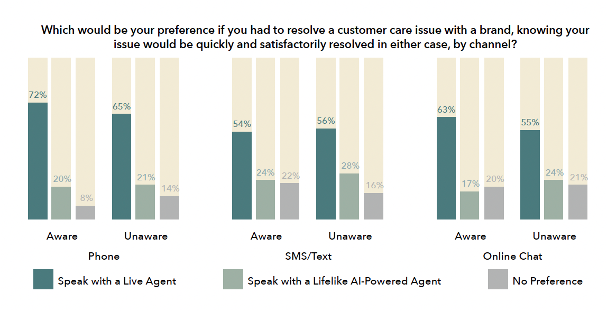When it comes to artificial intelligence (AI) in customer experience (CX), there’s an intriguing paradox: those with less awareness of AI tend to embrace it more readily than those who are more informed. Recent research from our Artificial Intelligence for CX: Exploring Consumer Perceptions report, published in partnership with Gladly, offers valuable insights for brands looking to optimize their AI strategies in the CX space.
But why is it that consumers with limited awareness of AI seem more open to its integration? And how can brands leverage this insight to educate and engage those who are already familiar with AI, particularly in terms of its impact on efficiency, accuracy, and ease in CX?
The Unaware Consumer
The research reveals that 44% of “unaware” consumers—those who are less knowledgeable about AI—express a positive sentiment toward brands using AI to resolve customer care issues, compared to only 31% of “aware” consumers. This is a significant divergence, one that begs the question: why are those who know less about AI more likely to trust it?
One possible explanation is that unaware consumers approach AI with fewer preconceived notions and biases. Without the weight of media narratives or industry jargon, these consumers may simply appreciate AI for its convenience and problem-solving abilities rather than scrutinizing it through a lens of skepticism. In contrast, those who are more aware of AI might be more critical, perhaps due to concerns about privacy, job security, or ethical implications.
This insight should serve as a wake-up call for brands: there is a need to balance education with reassurance. While it’s important to inform consumers about AI, overloading them with technical details or highlighting potential downsides can inadvertently cause fear and resistance.



Educating the Aware: A Strategic Approach
For brands aiming to engage consumers who are already aware of AI, the challenge is to shift the conversation from fear and skepticism to understanding and acceptance.
Here are a few strategies to consider:
- Focus on Tangible Benefits: Highlight how AI improves CX by increasing efficiency, ensuring accuracy, and providing ease of use. Consumers are more likely to embrace AI if they see clear, immediate benefits in their interactions with a brand. For instance, emphasizing how AI reduces wait times or enhances the precision of responses can help shift the narrative.
- Address Concerns Head-On: Transparency is key. Brands should openly discuss the ethical implications, potential biases, and security measures associated with AI. By doing so, they can build trust and demonstrate that they are not only aware of these issues but are actively working to mitigate them.
- Humanize the AI Experience: Consumers value human interaction, especially in complex or emotionally charged situations. A hybrid approach, where AI handles routine inquiries and seamlessly transitions to human agents when necessary, can offer the best of both worlds. This approach reassures consumers that while AI is present, it’s not a replacement for the human touch.
- Leverage Positive Case Studies: Share success stories where AI has significantly improved customer satisfaction. These stories can be powerful tools to illustrate AI’s potential when implemented thoughtfully.
A New Era of CX
As AI continues to evolve, so too must the strategies brands use to integrate it into their CX efforts. By understanding the differing perceptions between aware and unaware consumers, brands can tailor their messaging and approach to foster greater acceptance and trust. Ultimately, the goal is to create an AI-powered CX that is not only efficient and accurate but also resonates with the human values that consumers hold dear.
Download and read the full Artificial Intelligence for CX: Exploring Consumer Perceptions report for more key insights into optimizing your AI strategies in the CX space.


























































































































 TELUS Digital
TELUS Digital ibex delivers innovative BPO, smart digital marketing, online acquisition technology, and end-to-end customer engagement solutions to help companies acquire, engage and retain customers. ibex leverages its diverse global team and industry-leading technology, including its AI-powered ibex Wave iX solutions suite, to drive superior CX for top brands across retail, e-commerce, healthcare, fintech, utilities and logistics.
ibex delivers innovative BPO, smart digital marketing, online acquisition technology, and end-to-end customer engagement solutions to help companies acquire, engage and retain customers. ibex leverages its diverse global team and industry-leading technology, including its AI-powered ibex Wave iX solutions suite, to drive superior CX for top brands across retail, e-commerce, healthcare, fintech, utilities and logistics.






















 Trista Miller
Trista Miller



























